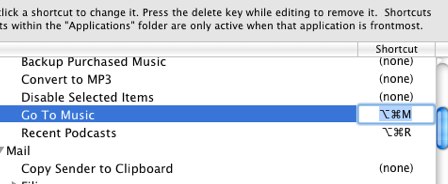October 20th, 2009
Lots of great information and sample code to boot.
I am always feeling overwhelmed and helpless when it comes to localization. The tools at our disposal don’t make it easy enough to “do it perfectly,” so I end up (for the most part) not offering localizations at all.
Maybe I should give in and adopt Wil’s strategy of essentially providing a UI that fits all languages. Unwanted white space be damned!
Posted in Cocoa, Indie, Links | 11 Comments »
September 15th, 2009
I’ve been fixing bugs and adding little tweaks to Black Ink, my nifty crossword solving application. Looks like they really piled up and it’s definitely time for a release!
Version 1.1.7 includes some fixes to the default puzzle source configuration, and a number of bug fixes ranging from minor to fairly significant.
Puzzle Sources
- Fix the Chronicle of Higher Education source
- Remove Syndey Morning Herald – the paper has stopped publishing new puzzles
- Fix a bug that could cause downloads to stop working until relaunching the app
Bug fixes and minor improvements
- Can now hover over a long puzzle title to see a tool tip window with the entire content
- Fix a visual bug with “Open As Unsolved” when the puzzle is already open
- Fix a bug that prevented numeric answers from being checked correctly
- Fix a bug that caused direction to change abruptly in puzzle that starts in “down” mode
Multi-character answer improvements
- When revealing a multiple character answer, make sure the “revealed” color applies to all characters
- Fix check-as-you-type for multi-character answers
- Enter Multiple Letters menu item is now called “Enter Special Letters”
- After entering multiple character answer, now jumps to next square same as when entering single
- Fix a bug that caused reveal/correct to fail on some multi-character answers
Posted in Black Ink | Comments Off on Black Ink 1.1.7
September 11th, 2009
I store most of my iTunes tracks in Apple’s AAC encoding format, but from time to time I find it useful to convert some tracks in my library to MP3 format. While AAC is convenient and works on my iPod, iPhone, etc., I have to concede that MP3 format is a little more universal.
In the iTunes “Advanced” menu you’ll find a convenient conversion item, which lets you convert the encoding of a selected song file to whatever your default import encoding is. The problem is, since I’m always importing as AAC, the only option it gives me is to convert to AAC:

To use iTunes to convert a song to MP3 format, I would have to open up Preferences, click the Import Settings button, and change my default encoding choice to the MP3 encoder. Then I would have to close preferences, do the conversion, and then preferences and switch my encoding choice back to AAC.
YUCK!
AppleScript to the rescue. Because iTunes exposes an attribute “current encoder”, and because AppleScript exposes a command “convert”, I can do all the mucking about behind the scenes in a quick-running script that performs theses steps:
- Save the current encoding setting.
- Switch to the MP3 encoder.
- Convert the selected songs.
- Set the encoder back to whatever it was
Download the Convert to MP3 script. Install it in [Home] -> Library -> Scripts -> Applications -> iTunes. It will show up in FastScript’s iTunes-specific section, where you can assign a keyboard shortcut if you like.
Now when I want to convert songs to MP3 format, I just select them in iTunes, and press the keyboard shortcut I assigned to the script in FastScripts:

The conversion happens immediately and my encoding preference is not disturbed.
Posted in AppleScript, FastScripts | 12 Comments »
September 10th, 2009
In response to the updated iTunes 9.0 from Apple, fellow developer Todd Ditchendorf complained on Twitter that the application still lacks a convenient shortcut for “jumping back to the music.”
I use iTunes all the time, but it hadn’t occurred to me how annoying this is. You’ve been fishing around in the iTunes store, or the Podcasts source, or Audiobooks, or any of the numerous other zones of the application. Then, you get the crazy notion to actually use iTunes to listen to music, so you jump to the search box and start searching. Bah! It’s not searching my music, it’s searching the App Store, or whatever. Now you have to go click the “Music” icon, and start your search again.
So yes, it would be handy to have a convenient shortcut to switch back to the Music source, and that is where my scripting utility FastScripts is particularly potent. It was a little tricky to deduce which magic scripting command would achieve the goal, but I think I figured it out:
tell application "iTunes"
set view of (browser window 1) to user playlist 1
end tell
Save this as a script file in your home directory:
[Home] -> Library -> Scripts -> Applications -> iTunes
This is an “Application-specific” scripts folder for iTunes, meaning it will only show up when the iTunes application is actually active and frontmost. Now you can open up FastScripts (free for up to 10 shortcuts) and use it to assign a keyboard shortcut:

Now when I’m browsing iTunes, I just press cmd-option-M and it jumps instantly to my music!
I have a bunch of iTunes scripts that I find useful. Over the next few days I’ll be highlighting other convenient tricks I use to make iTunes a more useful application through its scriptability.
Posted in AppleScript, FastScripts | 14 Comments »




